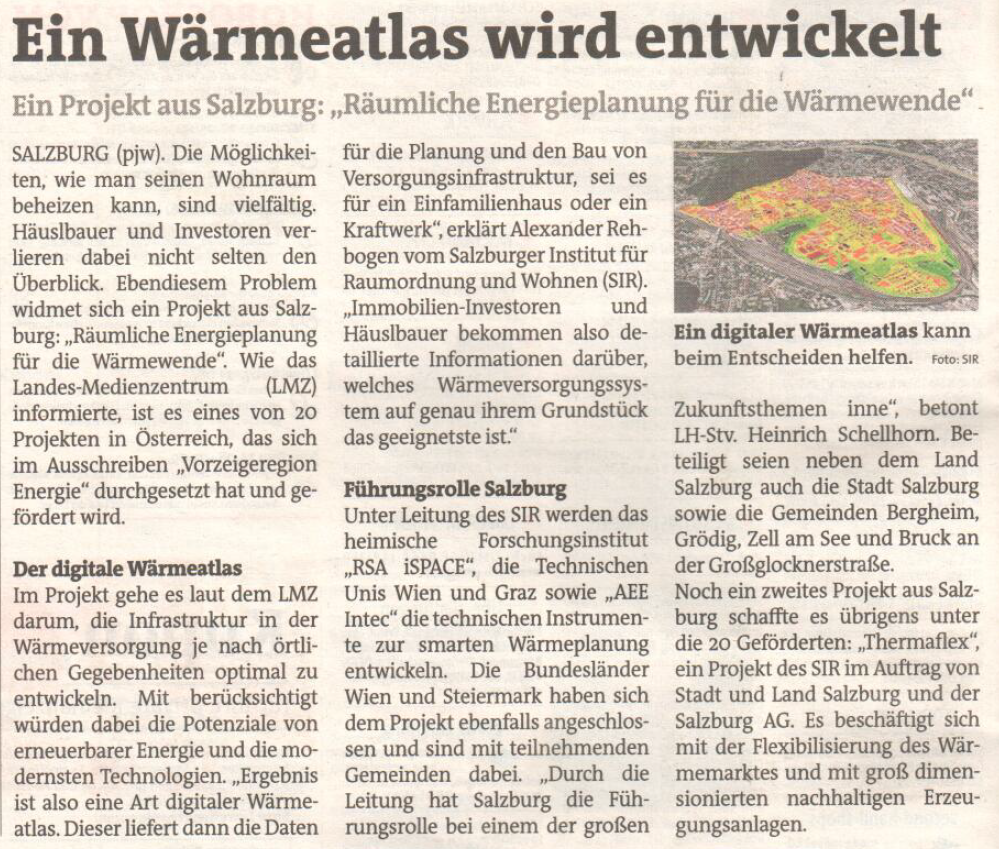Digital heat atlas as motor for heat reversal
The Research Studio iSPACE is leading the project “Spatial Energy Planning for the Heat Turnaround”, which is developing instruments for smart heat planning that will be implemented in Salzburg, Vienna and Styria. Innovative geoinformatics solutions of Studio iSPACE are the engine of the applications.
The state of Salzburg has set ambitious goals in the field of climate and energy. One of the focal points concerns heat supply, which is to be CO2-neutral by 2040. Now the state is supporting the pioneering communities in their plans. “The energy turnaround will only work if it reaches everyone. In Salzburg, we already have progressive laws and subsidies to achieve the ambitious goals. It is particularly important for us not to act primarily through bans, but to inform, promote and make possible in order to push the best technologies for a sustainable energy future”, said Energy Minister Heinrich Schellhorn.
The major goal is to make decision-making, the planning process and the official procedure in Salzburg in the course of the installation of a new heating system significantly more efficient and simpler, while at the same time significantly improving the quality of the decisions. Studio iSPACE’s digital heat atlas provides the basis for information, planning, and construction procedures. In the current project, a whole system of innovative instruments is being developed on the basis of the heat atlas, which is intended to promote important foundations for sustainable decisions in projects of all sizes, from single-family homes to power plant construction.
In two years at the latest, every house builder and investor is to receive detailed information about which heat supply system is the most suitable on the respective plot of land. “In the mass of the many technological innovations, it is a great challenge for consumers to maintain an overview. We want to give them the basis for the best decision”, says Rudolf Krugluger, head of the Department for Energy Management and Consulting in the Salzburg State Government. The right decision by the investor or house builder also has an impact on the entire energy infrastructure. “We have to plan our energy networks for the long term. Supply and investment security play key roles in this. The heat atlas can provide us here as a city with sustainable support,” says Franz Huemer, Smart City Coordinator of the City of Salzburg.
The possibilities for using the Heat Atlas are manifold and not only investors and house builders will benefit from the information provided by the Heat Atlas. Local authorities play a central role in the implementation. “We are currently revising our local development concept. With the new analysis methods, we can easily take the energy issue into account and thus plan a sustainable energy infrastructure in our community,” says Herbert Burgschwaiger, Mayor of the community of Bruck an der Großglocknerstraße. Project partner Grödig shows that the planning has a very effective effect in practice. “In a current area development, we have established on the basis of the heat atlas that a micro-network solution is the most sensible option. Instead of the originally planned individual heat pumps, an innovative low-temperature heating network will now in all likelihood be created,” says office manager Gerhard Freinbichler.
Heating networks are an important key to the integration of renewable energy sources, not only in Grödig. There are already more than 150 sustainable heating networks in Salzburg, mainly operated with biomass and waste heat. And if the experts have their way, they will not be the last.
The heat atlas is supported by the national lighthouse programme “Vorzeigeregion Energie”. For the implementation of their activities in the current project, the Salzburg partners have access to part of the more than € 30 million made available by the BMVIT and the Climate and Energy Fund for the best national projects. Under the direction of the Salzburg Institute of Regional Planning and Housing, iSPACE will be the lead developer and will develop the heat atlas over the next three years, drawing on the combined technological expertise of Vienna University of Technology, Graz University of Technology and AEE Intec. The state of Salzburg and the pioneering municipalities support the project and are already bringing the energy future to Salzburg today. This strong signal on the efficiency of Salzburg as a science location and on the innovative power of the local authorities is not only pleasing for climate protection.


